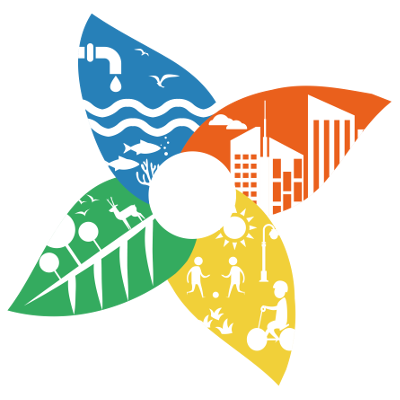Over the past decade, increasingly frequent extreme weather events and natural disasters highlight the importance of cities being resilient to climate change. Meanwhile, pioneers’ campaigns and efforts in promoting sustainable urban development have reverberated across the globe. There is now a clear consensus that our cities need to be more resilient.
Against this background, political leaders, practitioners and researchers gathered in Bonn to discuss how exactly to build urban resilience, by exchanging experience and knowledge, seeking and building partnerships, introducing new techniques, and putting forward new demands that involve social well-being and justice.
One major approach of constructing a resilient city, and more broadly, addressing sustainable challenges globally, is through nature-based solutions. However, to integrate nature-based solutions in current urban planning, cities are encountering a series of common challenges and problems, such as difficulties in green-grey integration, barriers in involving different stakeholders, lack of expertise in the field and/or little investment or ownership for implementing and sustaining nature-based solutions.
Within the NATURVATION project, work has been undertaken to support cites with knowledge and tools required to realize the potential of nature-based solutions. This knowledge and tools focused on taking action for urban nature were brought to Resilient Cities 2019, and were shared and further discussed with city representatives, practitioners and researchers from around the globe.
We started by sharing NATURVATION’s findings at a peer-learning workshop held on June 24th, which was joined by representatives from all of the Urban-Regional Innovation Partnerships (URIPs) – Newcastle, Malmö, Barcelona, Győr, Utrecht, and Leipzig – as well as other European cities and stakeholders (including Bologna, Bonn, Cascais, Genova, Lisbon, Milan, Strasbourg, Stockholm, Sumy, and Zagreb) to delve into the policy scenarios, governance strategies, business models, and citizen engagement for nature-based solutions.
Drawing on the Business Model Catalogue, Governance Solutions and Innovation Pathways Directory developed by the NATURVATION project, participants learned first-hand how to create inclusive business models and engaging citizens in the development of nature-based solution interventions. Following the interactive learning, participants then competed for designing a portfolio of nature-based solution interventions for the City of Győr, transforming a grey riverside square into a greenspace. Using the Urban Nature Atlas, participants identified successful nature-based solution cases that best matched the context and challenges of the selected project site, by developing a portfolio and enabling business model that could materialize the visions and design of the proposed nature-based solutions.
Learning by doing, this interactive workshop offered substantial take-aways for its participants. As Matija Vuger, the Head of Department for regional and international projects of the City of Zagreb, shared “today’s workshop brings new ideas, techs and sources, and puts on the table a lot of new solutions which can be implemented in the planning processes of the cities.”
The peer-learning workshop was followed by a full day of discussion sessions and training workshops around nature-based solutions in the European Urban Resilience Forum on June 25th.
Co-organizing a panel session with ICLEI, the NATURVATION team worked with city representatives and stakeholders to explore the enablers and barriers of collaboration for nature-based solutions. Several questions were addressed during the interactive session, including: What are successful examples of transversal collaboration? How do collaborative approaches enable developing common values, visions and resources? How can collaboration within/beyond municipal departments contribute to mainstreaming NBS?
City representatives as well as NATURVATION researchers shared their experiences in collaboration and discussed the key elements and strategic methods for fostering partnerships in implementing nature-based solutions.
This was highly appreciated by participants, such as Andrea Muno-Lindenau from Wissenschaftsladen Bonn e.V. who highlighted: “I am really happy to be here because there are a lot of people that are already on their way to make cities more resilient. The striking points of this session are the co-creation, engagement of people, collaboration and transdisciplinary approaches that are very useful and helpful. This type of session motivates me to continue with this kind of work.”
Whilst the NATURVATION project is mainly engaged at the European level, it is important to note that nature-based solutions and urban resilience are global practices. On June 28th, NATURVATION researchers Laszlo Pinter (Central European University), Matthew Bach (ICLEI European Secretariat), Attila Katona (Central European University) and Björn Wickenberg (Lund University) were joined by Jessica Kavonic (ICLEI Africa Secretariat), Nian She (Tsinghua University Innovation Center), and Guilherme Cavalcanti (AREIS) to form a panel of the Resilient Cities congress that explored global actions on nature-based solutions. By introducing specific urban cases from five countries on five continents, namely Winnipeg (Canada), Malmö (Sweden), Lilongwe (Malawi), Zhuhai (China), and Recife (Brazil), the panel discussion provided a global picture of how nature-based solutions live up to their promise as a force for making cities more resilient and sustainable.
As the record-setting heatwave gradually passed in Bonn, the Resilient Cities 2019 came to an end. However, heated discussion will continue, as will the actions taken by cities to work and thrive with nature. And, NATURVATION will continue to provide cities with the resources and knowledge they need to be a part of the solution.
Linjun Xie is a Researcher at Durham University working on the NATURVATION project
